Presented in a classic, green canvas and leather case, this is a no frills rifle, a practical rifle and one which is destined to hunt hard. For those of you unfamiliar with the calibre the .425 has 'neck and neck' ballistics with the .416 Rigby. Rigby would no doubt claim more power but we would object, strongly! The WR cartridge was designed to fit straight into a standard size Mauser action and originally the cartridges were sold in a 5 shot clip, you would load from the clip directly into the 5 shot drop magazine you see here on this rifle.
As you will see from the advertisement at the bottom of the post which is from our 1912 catalogue, we have reproduced the classic lines of the rifle faithfully, the drop box with horn nose which covers the hinge mechanism and the raised side panels with drop points both give this rifle its signature and masculine look.
As I imagine not everyone looks at the comments, I have added this response to the post. It says what I should have said, better than I could have!
Dear Simon, thank you, Exquisite, absolutely.
Sorry, but no 416 can come close! As you say this really is a classic rifle. The late Captain FC Selous would have been impressed. Wonderful to see this superb classic calibre making a comeback. So, we await posts highlighting new bespoke doubles with detachable locks chambering the .425. An earlier post here from your records listed a total of 33 double rifles built in .425 in just over a century.
It is timely to remember that Pondoro Taylor spoke well of this round, in fact he much desired more than just one gun in .425. This he made clear in arguing for a pair of bespoke rifles built to share a single calibre: one a double, the other a magazine, with custom barrel lengths, respectively. Poignantly, Taylor considered Westley Richard’s.425 the ideal calibre for this pair of rifles. It is worth recounting what he wrote in Big Game and Big Game Rifles (pg 207):
“I have often thought that a battery consisting of an open-sighted double .425 (26-inch barrels) and a ‘scope-sighted .425 magazine (25-inch barrel) would take an immense amount of beating for general all-round work amongst dangerous game, and am seriously considering just such a battery when it is possible for me to order a new one.” And one reads the near identical statement on pg 20 in African Rifles and Cartridges. Tragically, Taylor never realized his dream.
I like to term this nucleus of the Ideal Battery – quoting a Taylor chapter title – “Pondoro’s Pair”. Something to save for!
Further, with respect to similar big bores, we should remember the .425’s .435″ diameter bullet – at 410gr – outperforms the .423″ bullet of the highly respected and exhaustively tested .404 Jeffery; arguably, the .425 comes close to the .458s, with 90% of the latter’s cross-sectional area (CSA) and ~15% lighter bullet. But the .425 has the benefits of higher velocity and less recoil, and avoids the foibles of the too-short .458 Winchester “magnum” shell (with propellants etc) – albeit problems solved by the .458 Lott. Obviously, one is then dealing with a full-bore .450. And it is worth reflecting that the widely popular .416 has 8% less CSA.
Okay, I will stop this reply here….and not start on refuting all the silly speak by armchair critics about the rebated rim/barrel length/magazine-springs etc of the .425. This ignorant badmouthing a calibre they are unqualified to judge has been ridiculed by real experts who actually proved the .425 under challenging conditions.
Most grateful thanks to you for enlivening the easter weekend :-)
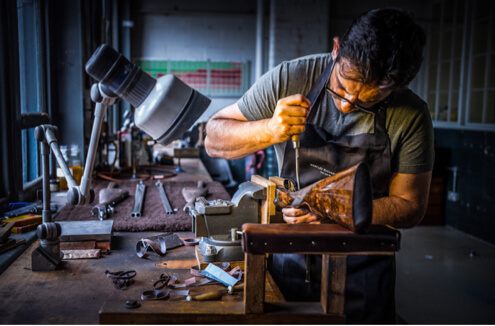
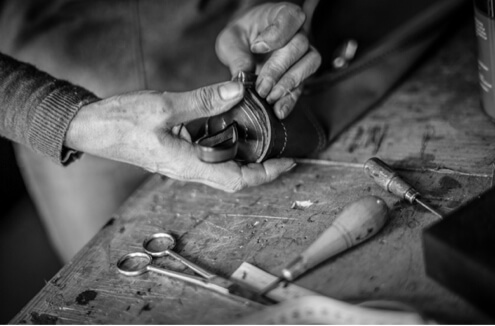
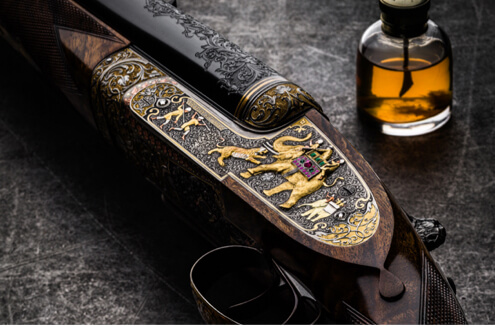
 Enquire
Enquire
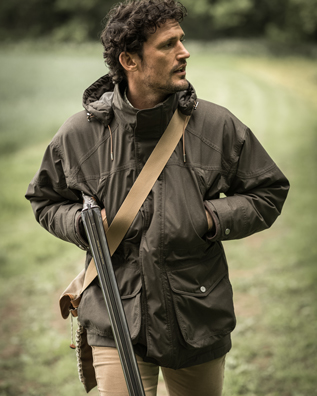
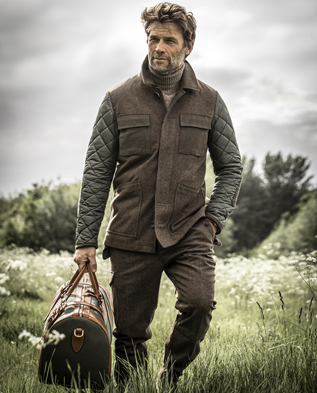
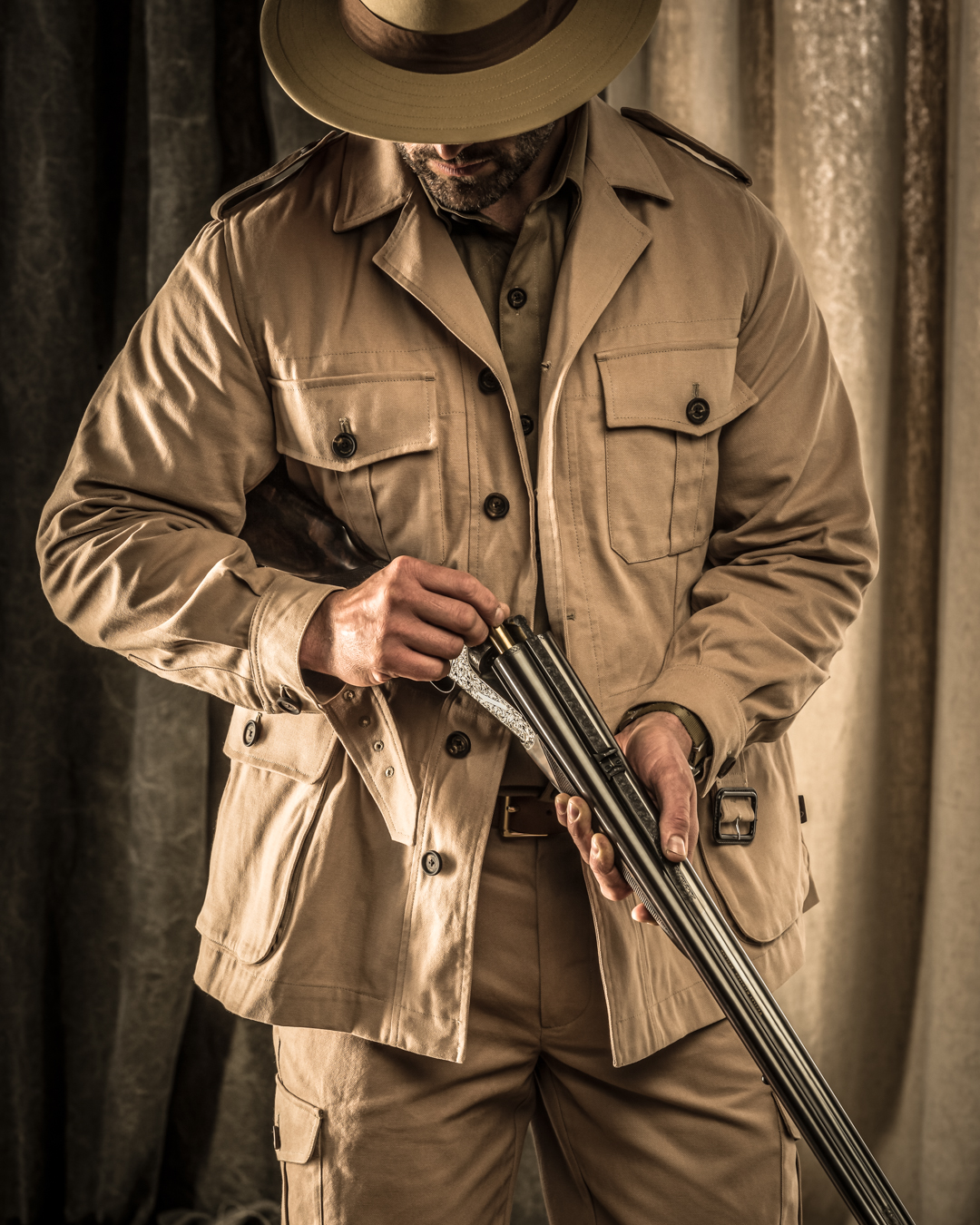
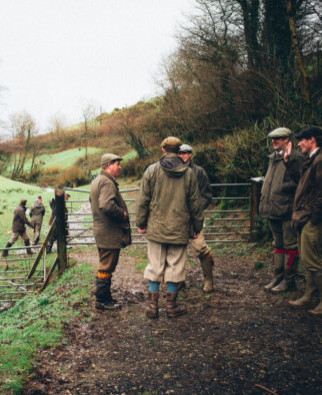
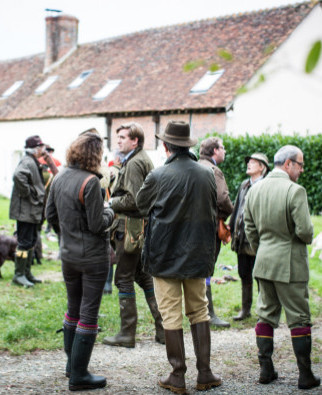

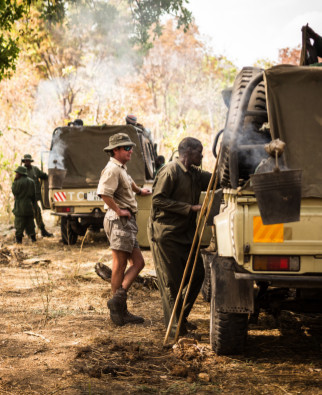
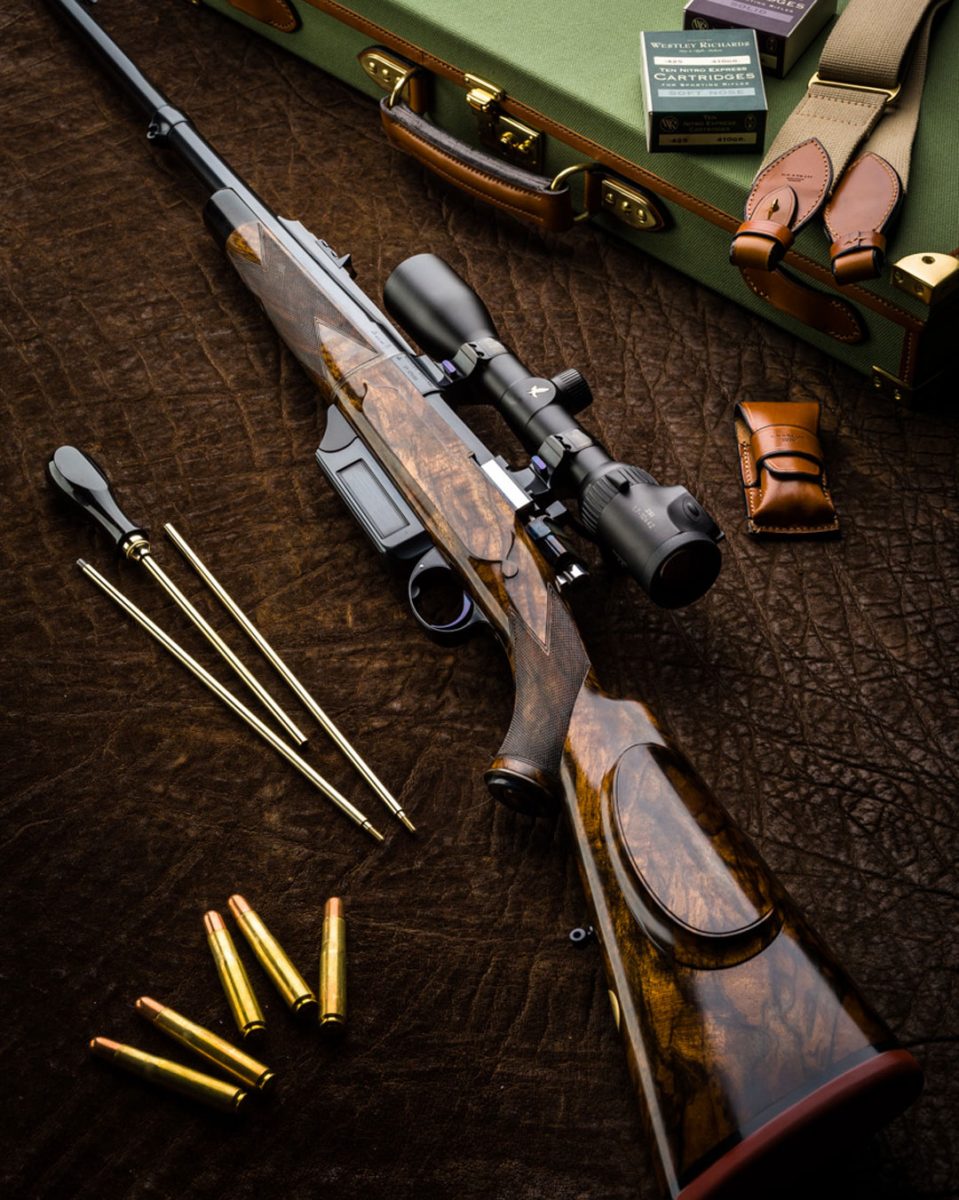
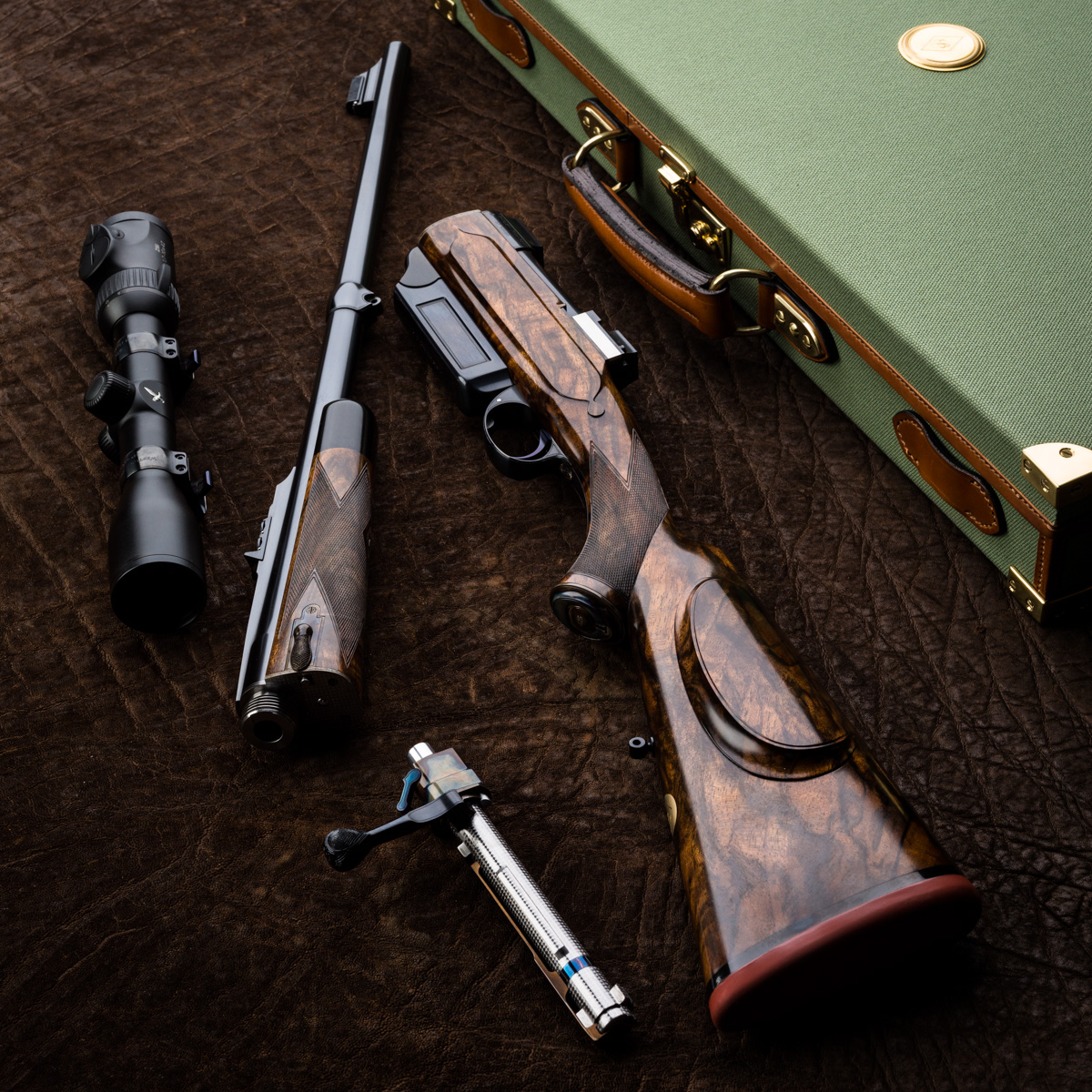
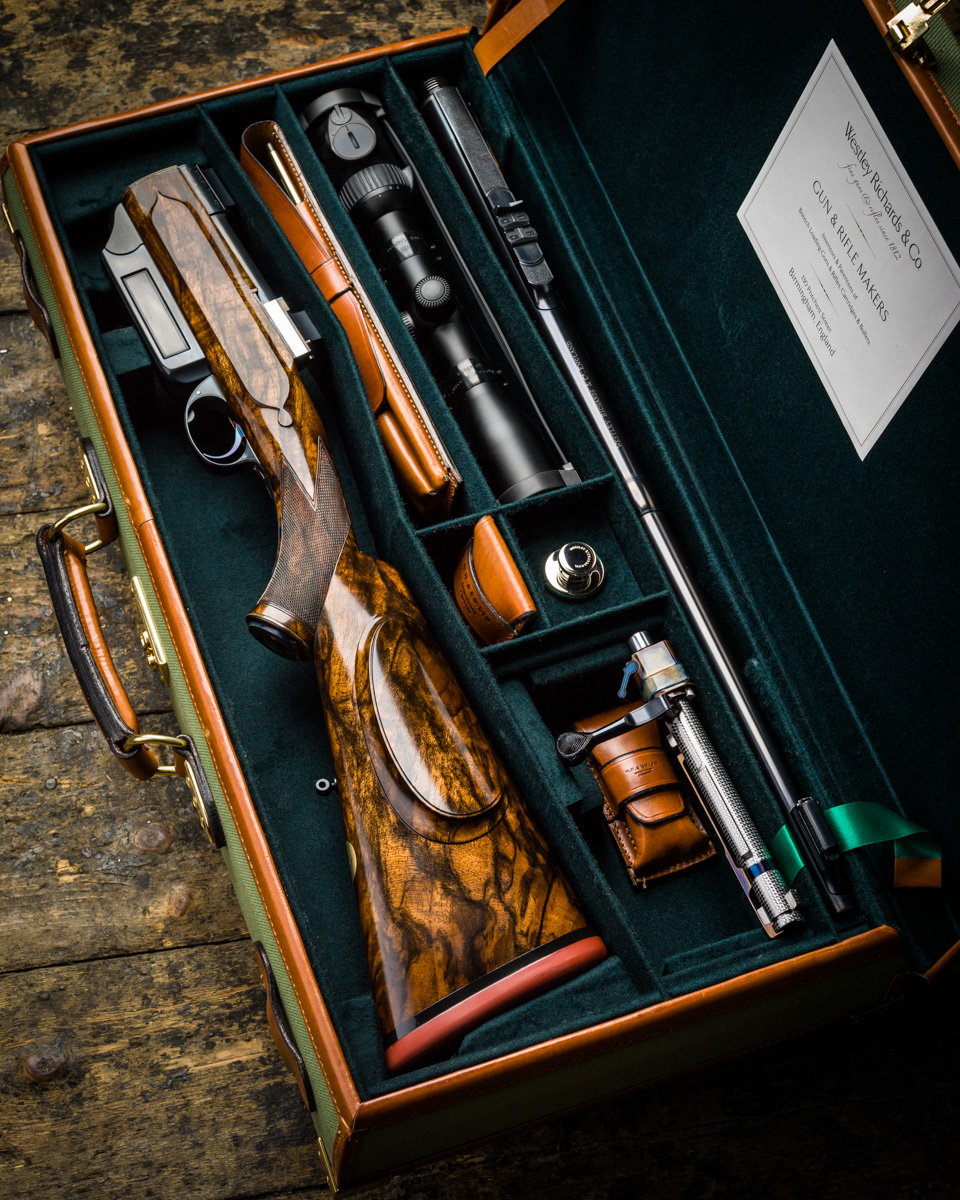
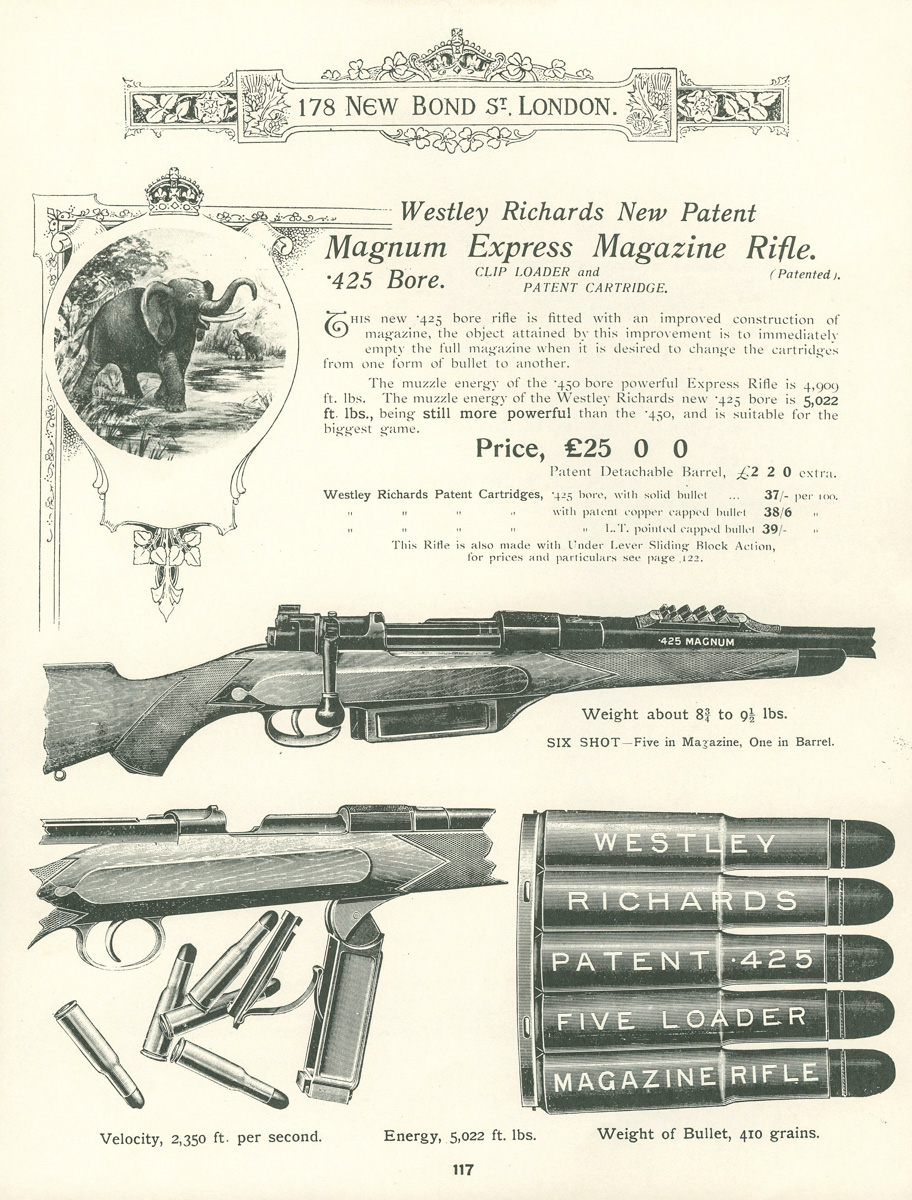


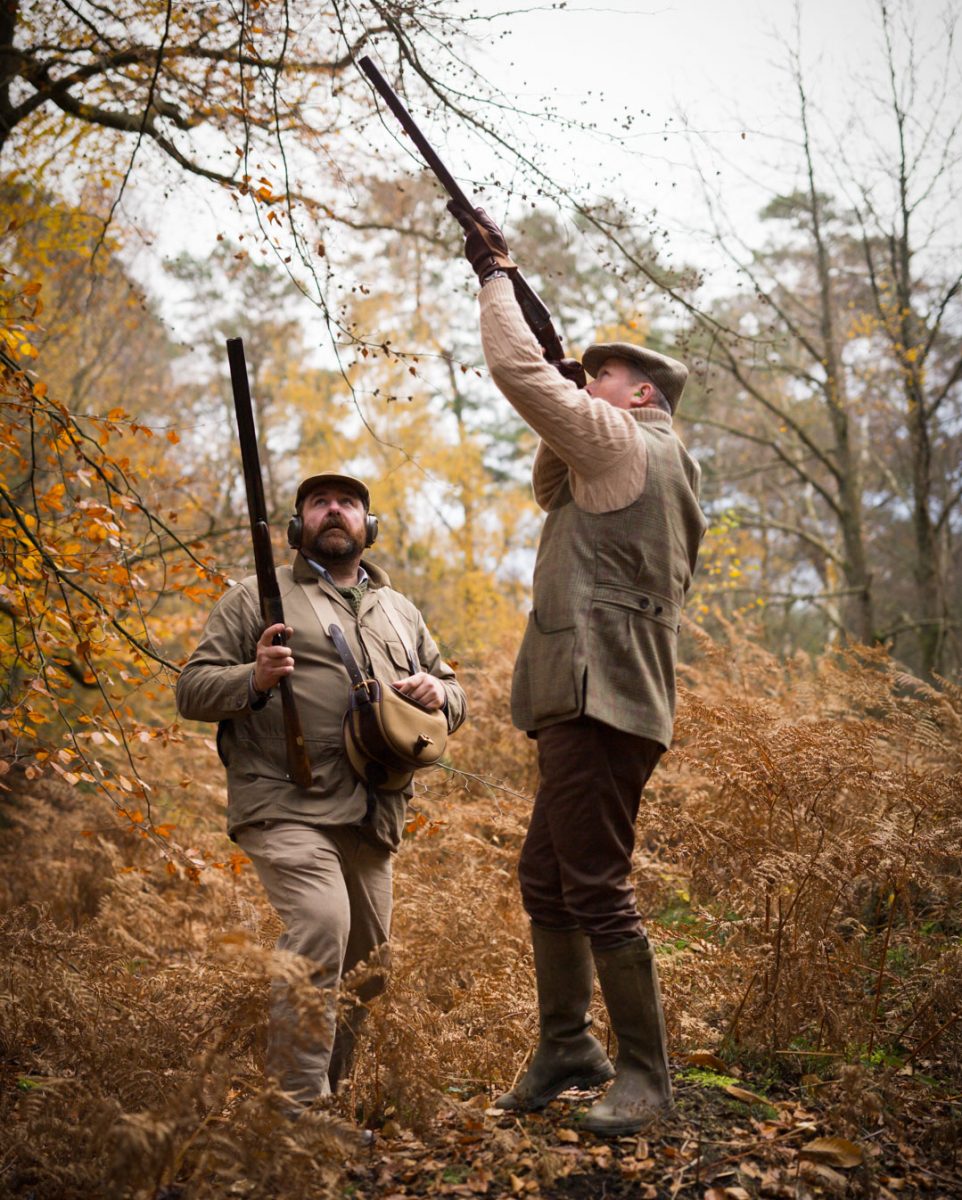



paul j. antonino on April 3, 2015 at 12:16 am
The gun is absolutely beautiful , nice to see that the typical drop magazine was kept . im pretty sure schuler was the only other company with this type of magazine box ,,i never found a nice enough 425 westley example for sale when i was looking ,,did you still retain the cartridge clips?.....paul
Simon Clode on April 3, 2015 at 7:31 am
Paul I think you are right about the Schuler, I have a 500 here and that has a similar short drop box doing the same job. Yes, we retained the little sprung cartridge clips and always fit them when we build this calibre.
Woody Cotterill on April 3, 2015 at 1:53 pm
Dear Simon, thank you
Exquisite, absolutely. Sorry, but no 416 can come close! As you say this really is a classic rifle. The late Captain FC Selous would have been impressed. Wonderful to see this superb classic calibre making a comeback. So, we await posts highlighting new bespoke doubles with detachable locks chambering the .425. An earlier post here from your records listed a total of 33 double rifles built in .425 in just over a century.
It is timely to remember that Pondoro Taylor spoke well of this round, in fact he much desired more than just one gun in .425. This he made clear in arguing for a pair of bespoke rifles built to share a single calibre: one a double, the other a magazine, with custom barrel lengths, respectively. Poignantly, Taylor considered Westley Richard’s.425 the ideal calibre for this pair of rifles. It is worth recounting what he wrote in Big Game and Big Game Rifles (pg 207):
"I have often thought that a battery consisting of an open-sighted double .425 (26-inch barrels) and a 'scope-sighted .425 magazine (25-inch barrel) would take an immense amount of beating for general all-round work amongst dangerous game, and am seriously considering just such a battery when it is possible for me to order a new one." And one reads the near identical statement on pg 20 in African Rifles and Cartridges. Tragically, Taylor never realized his dream.
I like to term this nucleus of the Ideal Battery - quoting a Taylor chapter title - “Pondoro’s Pair”. Something to save for!
Further, with respect to similar big bores, we should remember the .425's .435" diameter bullet - at 410gr - outperforms the .423" bullet of the highly respected and exhaustively tested .404 Jeffery; arguably, the .425 comes close to the .458s, with 90% of the latter’s cross-sectional area (CSA) and ~15% lighter bullet. But the .425 has the benefits of higher velocity and less recoil, and avoids the foibles of the too-short .458 Winchester "magnum" shell (with propellants etc) - albeit problems solved by the .458 Lott. Obviously, one is then dealing with a full-bore .450. And it is worth reflecting that the widely popular .416 has 8% less CSA.
Okay, I will stop this reply here....and not start on refuting all the silly speak by armchair critics about the rebated rim/barrel length/magazine-springs etc of the .425. This ignorant badmouthing a calibre they are unqualified to judge has been ridiculed by real experts who actually proved the .425 under challenging conditions.
Most grateful thanks to you for enlivening the easter weekend :-)
all the best
Woody
Simon Clode on April 3, 2015 at 3:22 pm
Thank you for such a well written comment, I am going to add it to the post for the people who don't venture into the comments!
Simon
Vance Daigle on April 3, 2015 at 4:02 pm
Morning Guys & Gals
Thank you Simon for the quick response on a Take Down Rifle. It is certainly a lovely gun that will bring this young owner many years of service. It is very interesting to me just how it works, that you are able to cut a barrel and reattach repeatedly without loosing much of its accuracy. While there may be much discussion about caliber. For me its about shooting where you aim time after time. This is quite a marvel of both beauty and engineering. Happy Easter!!!
In Christ
Vance,
Peter Martinsson on April 4, 2015 at 6:33 pm
Mr. Clode.
Absolutely stunning rifle in a really classic Westley style and an equally stunning case. I must say after looking at the 700/577 and this rifle its not only the rifles you make that is fantastic, also the cases is a work of art.
Gary Duffey on April 7, 2015 at 4:49 pm
The W-R .425 is if not the most, certainly one of the most maligned of modern cartridges. That opinion can only come from limited or no experience with it. I have no doubt that the alleged feeding and magazine problems have taken place. However it has been demonstrated by a couple of credible people that this was entirely due to the mixing of the originally supplied follower with that intended for say 8 mm or 9.3x62 mm Mauser or other cartridge. This off course is an act beyond the control of the maker and no inherent fault in the cartridge design. Photos of the followers clearly show this. I would add that it is an odd looking cartridge. The rebated rim and the long neck are so different in comparison to the 'modern' appearance of newer cartridges. What it does provide is a case size ideally suited for today's powders, coupled with the great Woodleigh bullets with great neck tension due to the long neck, and great frontal area. The sectional density of these bullets is still very high and gives up nothing significant to any other cartridge. Velocities of 2300-2400 are easily achieved with moderate recoil and rifle weight can be kept reasonable due to the use of standard length actions. It it in every sense a useful .40 caliber that is as viable today as its glowing recommendations from the great and famous hunters of the past. I will save the ability to use stripper clips for a future dedicated blog article.
Woody Cotterill on April 11, 2015 at 10:38 am
Words of measured wisdom. It is indeed bizarre how superstitions persist; the key facets of .425 designed before 1909 are still under appreciated, especially with today's technology that can realise the full potentials of shell and bullet. Much of this knowledge remains scattered, or as you say too many of those with real bush experience have sadly departed the hunting fields. Too few seem to have published their knowledge. The only publication I know describing the follies of wrong magazine followers was 15 years back - by Charlie Haley in the January 2000 issue of Magnum (S African). The pdf is on a couple of discussion sites. Here's one for this article and two more:
http://singleactions.proboards.com/thread/5044/425-westley-richards-magnum?page=3
Building on the sample of .425 rifles he'd examined, Charlie Haley was fortunate to test the very last of the 16 .425 magazines in the armoury of Zimbabwe’s Tsetse Control Department before they were sold off. Before ammunition became unavailable, these had seen intensive service in the then Southern Rhodesia and quite possibly elsewhere in the Federation. His pithy diagnosis of the only two malfunctioning rifles makes interesting reading. The subject was also summarized recently in the .425 account in African Dangerous Game Cartridges by Pierre van de Walt.
By all accounts Woodleigh bullets set the standards, but there are also Rhino and Dzombo .435” bullets made in South Africa, which come with authoritative endorsements.
John Taylor summed up the cartridge - "There is no question, it is a most excellent cartridge and a real killer."
M Ward on April 9, 2015 at 12:58 am
Beautiful! Would you share the particulars? Barrel length, stock dimensions, etc.?
Mike
Simon Clode on April 9, 2015 at 2:07 pm
Thank you! The barrel length is 24 inches, stock length is 15 1/8", 5 shot magazine so 5 + 1, cartridge clips, side panels, name in platinum and double line border engraved.
M Ward on April 9, 2015 at 6:15 pm
Thanks, Simon. Why on earth do those of us on this side of "the pond" still suffer with 13.5 inch LOPs that put our thumbs right under our noses?
Simon Clode on April 9, 2015 at 8:15 pm
I think because you have the 'out of the box' Remington and Winchester stock measurements ingrained in your culture. They probably set this measurement 100 years ago when people were smaller and have never revised it! I have always found it strange that many custom makers follow suit as that is presumably how the plastic stock come also!
We would of course be happy to build you anything with a stock length from 12" - 17" LOP!
M Ward on April 10, 2015 at 12:42 pm
Simon:
It's interesting that you mention how we (in the USA) established a standardized length of pull. Below is a portion of a note I sent to John Barsness, a gun-writer from Montana:
"John,
One of the things that I find interesting is how we will often tinker with all sorts of things - throat, twist, barrel length, triggers, etc. - but generally are satisfied a stock that is constructed for the "average" man: 5'10" and 170 lbs. (or whatever it is), when the fact of the matter is, very few of us fit those exact dimensions, not to mention arm length, neck length, facial features, etc. ... Most shotgunners are almost obsessed with proper stock fit. ... Not so most riflemen: we've been shooting 13.5 - 13.75 inch LOP for years. Why don't we seem to be as concerned with proper stock fit as the scatter-gunners? ... I am not all that big: 6'1", 200 pounds, with a 34 inch sleeve. That is probably more 'average' today than it was three or four generations ago when factory stock dimensions seem to have been established.
Now, I know that we always talk about how we need a shorter stock because of hunting in cold weather, but I think the Europeans figured out a long time ago that most people need a bit more length. Even rifles from cold climates, where thick clothing is often called for, still have 14+ inch LOPs. As a matter of fact, that Westley Richards that I mention on another thread the other day has a 15 1/8 inch LOP. Granted, that rifle is going to Africa, but that is still a lot longer than most of us would ever consider for warm weather hunting.
One consideration, I know, that concerns most people - even long armed buggers like me - is eye relief on a scope. Even if a long stock feels good, there is still the probability of having to crawl just to get proper eye relief. But some companies, like Swarovski, make extended eye relief scopes that give another inch or so of relief. I'm sure that if there was enough demand, Leupold, etc., would follow suit.
Anyway, I don't know where I'm going with all of this except to say that it strikes me that, as I said, we'll tinker with all sorts of stuff but unlike with shotgunners, I rarely read of anyone going to the trouble of having a rifle stock correctly fitted. We just seem to be satisfied with whatever dimensions the makers tell us we need."
The rifle I mention in the post is the one on this thread. As I said, absolutely beautiful.
And thanks for the offer, but as they say, "Champaign taste, beer budget." Owning a custom fitted WR in .275 (7x57), would be a dream come true, and I would certainly see a lot of use in the field (central Florida boar), but as it is I'll have to be satisfied with the pictures you post.
I wish you "Good Hunting!"
Mike
Narendra Pratap on October 25, 2016 at 9:34 am
In India. 318 WR Rifle and .425 WR Magnum Rifle are available or not for license to the civilians.
Please give me correct information about these rifles.
Simon Clode on October 25, 2016 at 9:52 am
I think they are currently not available unless you are able to secure an Import licence. The 'used' rifles are possible available in India if you can find one but I do not know if you are allowed to own or not.
Simon
Alec Swan on August 10, 2018 at 10:43 am
Late in to this conversation, and from the start I've never used any big bore cartridge.
The .425 is certainly a most curious cartridge. The rebated rim - how on earth do they get them to extract on doubles? The relatively small case when we compare it to the .416. The fact that the round was - and may well still be - revered by many. …. and this all leaves me wondering if we don't - initially anyway - choose a cartridge by eye appeal rather than by it's tested ballistics. Do we look at the great big fat and sexy .416 and so do we dismiss the more modest, by appearance, .425?
I do have some experience with hand loading rifle cartridges, and so using them and I would *always* prefer a case which can be filled to near capacity before one which is half empty of powder. Providing that the case with little spare room has a barrel of adequate length to assist with the burning of the charge, then that would be the way to go, I suspect.
The bolt action rifle at the head of this discussion is exquisite and no other work will do. Another Westley success!
Shaiaz Shah on February 3, 2019 at 12:50 am
How efficient is this cartridge for elephant ?
Trigger on February 4, 2019 at 9:05 am
Hi Shaiaz
This cartridge is certainly efficient for elephant and was used by Game Departments for the cropping of elephant way back.
Best regards
Trigger
Ndlovu on April 14, 2019 at 9:39 pm
Dear All
I am that most fortunate of men - although of moderate income, I own a .425 Westley Richards, which cost me nothing! My father acquired the rifle, complete with carrying case and a fair amount of solid and LT Capped expandingcartridges in 1940, while on active service in Abyssinia with the South African Army. And thereby hangs a tale ... About 40 years ago I contacted WR for some background information, but all they could tell me was that it was sold in 1912 but the records have been lost or destroyed. It doesn't come close to the splendid take-down model you illustrate - it is a standard rifle, I assume of the widely used type. But it is in fine condition and has a most interesting side-mounted Zeiss scope. I have never hunted with it, but enjoyed firing it from time to time till the cases started splitting in the late 1960s - sheer old age, I imagine. So the old beauty hasn't spoken for a long time. But my current hobby project is getting it talking again; I have acquired new cases and bullets from Australia, and as soon as I can afford to import a set of loading dies (thanks to our currency's present horrendous exchange rate, this is something to save up for) the old WR will be heard from. And yes, it's a sweetheart to shoot, and it has a nice long stock which fits me like a glove (I am a six foot six-incher). BTW, please forgive me for using a pseudonym (it's Zulu for "elephant"), but the crime rate here is pretty bad, and that includes targeted home invasions.
A tip of the hat to all
Ndlovu
Ndlovu on April 14, 2019 at 10:24 pm
Dear All
Forgot to mention, in case you don't know - many years ago Jack Lott - another .425 lover - got over the problem of finding the rebated rim cases by acquiring a Mauser bolt of appropriate quality and opening up the face to take a 404 Jeffery base. He then resized Jeffery cases into 425. Problem solved.
cheers
Ndlovu